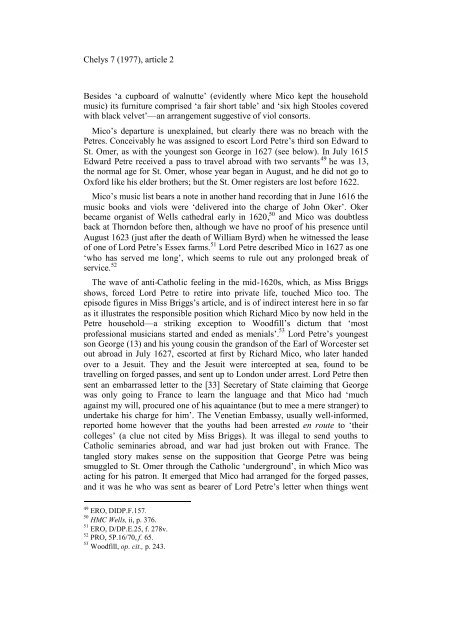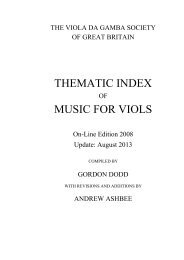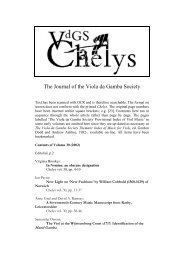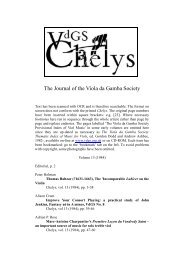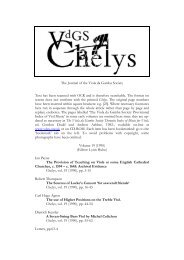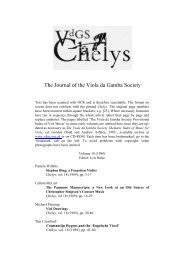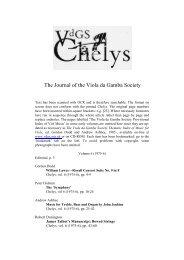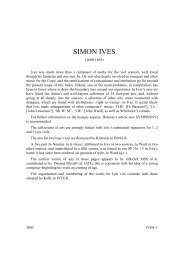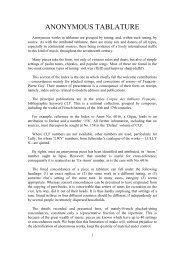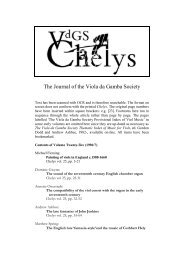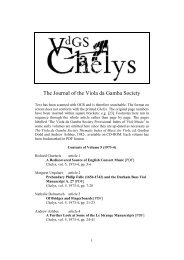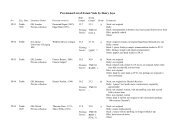download.pdf - 6.3Mb - Viola da Gamba Society
download.pdf - 6.3Mb - Viola da Gamba Society
download.pdf - 6.3Mb - Viola da Gamba Society
Create successful ePaper yourself
Turn your PDF publications into a flip-book with our unique Google optimized e-Paper software.
Chelys 7 (1977), article 2<br />
Besides ‘a cupboard of walnutte’ (evidently where Mico kept the household<br />
music) its furniture comprised ‘a fair short table’ and ‘six high Stooles covered<br />
with black velvet’—an arrangement suggestive of viol consorts.<br />
Mico’s departure is unexplained, but clearly there was no breach with the<br />
Petres. Conceivably he was assigned to escort Lord Petre’s third son Edward to<br />
St. Omer, as with the youngest son George in 1627 (see below). In July 1615<br />
Edward Petre received a pass to travel abroad with two servants 49 he was 13,<br />
the normal age for St. Omer, whose year began in August, and he did not go to<br />
Oxford like his elder brothers; but the St. Omer registers are lost before 1622.<br />
Mico’s music list bears a note in another hand recording that in June 1616 the<br />
music books and viols were ‘delivered into the charge of John Oker’. Oker<br />
became organist of Wells cathedral early in 1620, 50 and Mico was doubtless<br />
back at Thorndon before then, although we have no proof of his presence until<br />
August 1623 (just after the death of William Byrd) when he witnessed the lease<br />
of one of Lord Petre’s Essex farms. 51 Lord Petre described Mico in 1627 as one<br />
‘who has served me long’, which seems to rule out any prolonged break of<br />
service. 52<br />
The wave of anti-Catholic feeling in the mid-1620s, which, as Miss Briggs<br />
shows, forced Lord Petre to retire into private life, touched Mico too. The<br />
episode figures in Miss Briggs’s article, and is of indirect interest here in so far<br />
as it illustrates the responsible position which Richard Mico by now held in the<br />
Petre household—a striking exception to Woodfill’s dictum that ‘most<br />
professional musicians started and ended as menials’. 53 Lord Petre’s youngest<br />
son George (13) and his young cousin the grandson of the Earl of Worcester set<br />
out abroad in July 1627, escorted at first by Richard Mico, who later handed<br />
over to a Jesuit. They and the Jesuit were intercepted at sea, found to be<br />
travelling on forged passes, and sent up to London under arrest. Lord Petre then<br />
sent an embarrassed letter to the [33] Secretary of State claiming that George<br />
was only going to France to learn the language and that Mico had ‘much<br />
against my will, procured one of his aquaintance (but to mee a mere stranger) to<br />
undertake his charge for him’. The Venetian Embassy, usually well-informed,<br />
reported home however that the youths had been arrested en route to ‘their<br />
colleges’ (a clue not cited by Miss Briggs). It was illegal to send youths to<br />
Catholic seminaries abroad, and war had just broken out with France. The<br />
tangled story makes sense on the supposition that George Petre was being<br />
smuggled to St. Omer through the Catholic ‘underground’, in which Mico was<br />
acting for his patron. It emerged that Mico had arranged for the forged passes,<br />
and it was he who was sent as bearer of Lord Petre’s letter when things went<br />
49 ERO, DIDP.F.157.<br />
50 HMC Wells, ii, p. 376.<br />
51 ERO, D/DP.E.25, f. 278v.<br />
52 PRO, 5P.16/70, f. 65.<br />
53 Woodfill, op. cit., p. 243.


